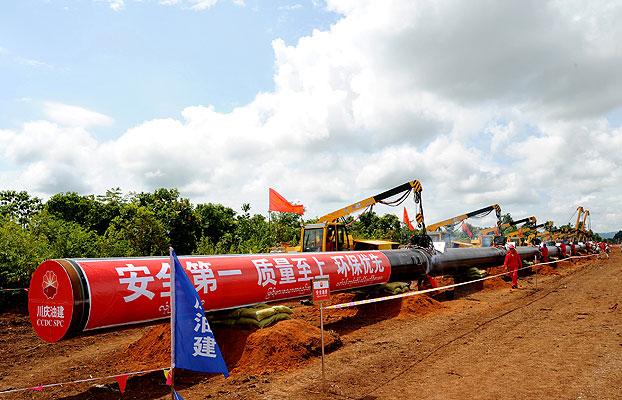Speaking to Mizzima on behalf of state-run China National Petroleum Corporation (CNPC), the Secretary to the Chinese Ambassador in Yangon, Xiong Guofeng, said that the company did not force workers at its pipeline plant on Maday Island to sign a pledge saying they would not participate in Thursday’s demonstration, and furthermore that they did not dismiss more than 50 workers who refused to do so.
The allegation that more than 50 workers were subsequently fired from their jobs for refusing to sign the pledge was made by the Maday Island Development Committee.
 The Committee’s chairman, Tun Kyi, also told Mizzima that following the march on Thursday, 10 demonstrators had been charged by police with protesting without a permit.
The Committee’s chairman, Tun Kyi, also told Mizzima that following the march on Thursday, 10 demonstrators had been charged by police with protesting without a permit.
However, the Embassy representative told Mizzima that the Chinese enterprise fully respects the right to peaceful protest by the Myanmar people.
In addition, he pointed out that the pipeline project, which is soon due to transport oil and gas from the Bay of Bengal to China’s Yunnan Province, is a multi-beneficial project with stakeholders not only from China, but India, South Korea and Myanmar.
He stressed that the pipeline would benefit the people of Myanmar and that the contract to develop the pipeline met with all relevant Myanmar laws and was agreed upon in accordance with international standards.
“Since the commencement of the project in 2010, CNPC has spent more than US$14 million in education, healthcare and social development along the pipeline, including a $10 million cash donation to upgrade the Rakhine Regional Electric Power Grid, nearly 50 primary and middle schools, 24 hospitals and healthcare centers, and more,” Xiong said.
He said some $60 million had been set aside for continued education, healthcare and other issues over the operating period of the next 30 years.
The 800 protesters who marched to the CNPC office on Maday Island on Thursday issued a list of demands, calling for the Chinese firm to invest in the development of the island, as well as jobs and compensation for its residents.
However, Xiong Guofeng pointed to several instances of projects on the island that he said CNPC had donated to or invested in:
- “A new brand water reserve was constructed in the center of the island, which could provide 220,000 tons of clean water to the local residents every year. The local villagers no longer drink dirty water which badly harmed their health.”
- “A healthcare center was built near the camp of the project, which provides free healthcare to more than 2,200 islanders.”
- “A primary school was constructed near the village, so the nearby children can receive free basic education there.”
- “An inter-village connection road network was successfully built, which helps the local residents travel more easily.”
- “When last year’s communal unrest spread to Kyaukphyu, CNPC donated $50,000 and 10 tons of rice to the local Kyaukphyu government to alleviate hunger.’
“The Chinese government is always encouraging its highly reputable enterprises to expand investment in Myanmar, requires them to comply with Myanmar law, instructs them to fulfill Corporate Social Responsibility and establish amicable relations with local residents,” said Xiong.


